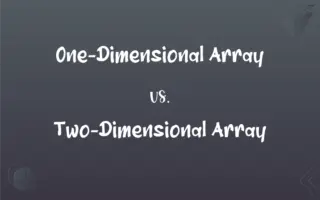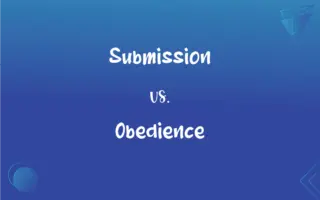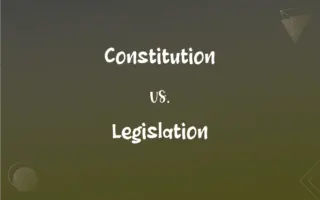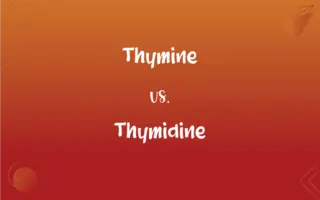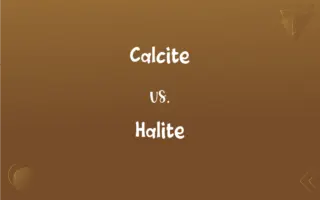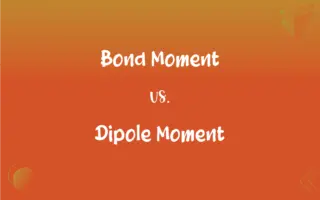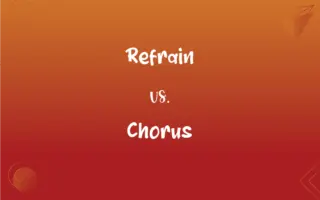Blew vs. Blue: What's the Difference?
Edited by Aimie Carlson || By Harlon Moss || Published on February 14, 2024
"Blew" is the past tense of the verb "blow," meaning to expel air. "Blue" is an adjective describing a color.

Key Differences
Blew is the past tense form of the verb "blow," which means to expel air through the mouth or to be moved by the wind. It is a verb that conveys action or an occurrence. For instance, "He blew out the candles on his birthday cake." In contrast, Blue is an adjective that describes the color blue, associated with the sky and the sea. It is used to describe the appearance of objects, as in "The sky was a deep shade of blue."
The use of blew often implies an action that has been completed in the past. It can describe actions ranging from blowing air from one's mouth to the effects of wind on objects, such as "The wind blew the leaves off the tree." Conversely, Blue is used to describe a hue in the color spectrum. It can also represent feelings of sadness, as in the phrase "feeling blue," symbolizing a state or condition rather than an action.
In terms of grammatical function, blew serves as a verb, specifically the simple past tense of "blow." Its usage is often related to physical actions or natural phenomena, for example, "She blew a kiss to her friend." On the other hand, Blue functions as an adjective, modifying nouns and pronouns. It is used to provide descriptive detail, such as in "He wore a blue shirt to the meeting."
The word blew can also form part of idiomatic expressions or phrases, conveying meanings beyond the literal act of blowing. For instance, "He blew his chance" implies that an opportunity was missed or wasted. In contrast, Blue can be part of expressions related to emotion or mood, such as "out of the blue" to describe something unexpected, or "blue mood" indicating sadness.
Blew can be used metaphorically or figuratively, as in "The scandal blew up in their faces," suggesting a situation worsening suddenly. Whereas, blue can also have metaphorical uses, often related to mood or surprise, like "a bolt from the blue," which means a sudden and unexpected event.
ADVERTISEMENT
Comparison Chart
Part of Speech
Verb (past tense of blow)
Adjective (describing color or mood)
Meaning
To expel air or be moved by wind
A color; can also imply sadness
Usage
Action-oriented (blowing, wind effect)
Descriptive (color, emotion)
Examples in Sentences
"She blew bubbles in the park."
"His eyes were a striking shade of blue."
Idiomatic Expressions
"That news blew me away."
"It happened out of the blue."
ADVERTISEMENT
Blew and Blue Definitions
Blew
Past tense of blow, meaning to expel air from the mouth.
He blew on his hands to warm them up.
Blue
Referring to a genre of music, namely blues.
They listened to old blue records all night.
Blew
To cause air to move or flow.
She blew the whistle loudly during the game.
Blue
Describing the color resembling that of a clear sky.
The blue dress she wore was stunning.
Blew
To waste or miss (an opportunity).
He blew his chance to win the competition.
Blue
Used to describe films or content that is mildly indecent.
The comedian's blue humor was not appreciated by everyone.
Blew
To destroy or burst suddenly.
The old tire blew on the highway.
Blue
Expressing or feeling melancholy or sad.
He's been feeling blue since she left.
Blew
To be moved or affected by the wind.
The tent blew away in the storm.
Blue
Indicating something unexpected or surprising.
The news came out of the blue.
Blew
Past tense of blow1.
Blue
The hue of that portion of the visible spectrum lying between green and indigo, evoked in the human observer by radiant energy with wavelengths of approximately 420 to 490 nanometers; any of a group of colors that may vary in lightness and saturation, whose hue is that of a clear daytime sky; one of the additive or light primaries; one of the psychological primary hues.
Blew
Past tense of blow3.
Blue
A pigment or dye imparting this hue.
Blew
Past participle of blow
Blew
Obsolete form of blue
Blew
Obsolete form of blue
FAQs
Can 'blew' be used metaphorically?
Yes, 'blew' can be used metaphorically, like in "blew his chance," meaning missed an opportunity.
What does 'blew' mean?
'Blew' is the past tense of 'blow,' meaning to expel air or to be moved by the wind.
What is a common expression using 'blew'?
A common expression is "blew me away," meaning something was astonishing.
How is 'blue' used in music?
'Blue' refers to a music genre known as blues, often expressing sorrow.
What does 'blue' represent as a color?
As a color, 'blue' represents the hue of a clear sky or the ocean.
Is 'blue' used to describe feelings?
Yes, 'blue' can describe sadness or melancholy, as in feeling blue.
What actions can 'blew' describe?
'Blew' can describe actions like blowing a whistle or the wind blowing.
Can 'blue' be used in fashion?
Yes, 'blue' is a common color description in fashion, as in "blue jeans."
What is the verb form of 'blew'?
The verb form of 'blew' is 'blow.'
Is 'blue' associated with specific genres of film or literature?
Yes, 'blue' can describe films or content that is mildly indecent or risqué.
Can 'blue' indicate surprise?
Yes, phrases like "out of the blue" indicate something surprising or unexpected.
Is 'blue' used in expressions about the unexpected?
Yes, like "bolt from the blue," meaning something totally unexpected.
Can 'blew' imply destruction?
Yes, as in "the bomb blew up," implying destruction.
What is a 'blue moon'?
A 'blue moon' refers to an additional full moon that appears in a subdivision of a year.
Are there synonyms for 'blew'?
Synonyms include 'gusted' or 'puffed' depending on the context.
Can 'blew' be used in past perfect tense?
Yes, as in "had blown" for past perfect tense.
What is the difference in usage between 'blew' and 'blue'?
'Blew' is used for actions related to blowing, while 'blue' describes color or mood.
Does 'blew' have different forms for different tenses?
Yes, like 'blow' for present and 'blown' for past participle.
Does 'blue' have cultural significance?
Yes, 'blue' can have various cultural meanings, such as representing loyalty or calmness.
Is 'blew' used in idioms?
Yes, like "blew the lid off," meaning to expose something.
About Author
Written by
Harlon MossHarlon is a seasoned quality moderator and accomplished content writer for Difference Wiki. An alumnus of the prestigious University of California, he earned his degree in Computer Science. Leveraging his academic background, Harlon brings a meticulous and informed perspective to his work, ensuring content accuracy and excellence.
Edited by
Aimie CarlsonAimie Carlson, holding a master's degree in English literature, is a fervent English language enthusiast. She lends her writing talents to Difference Wiki, a prominent website that specializes in comparisons, offering readers insightful analyses that both captivate and inform.

